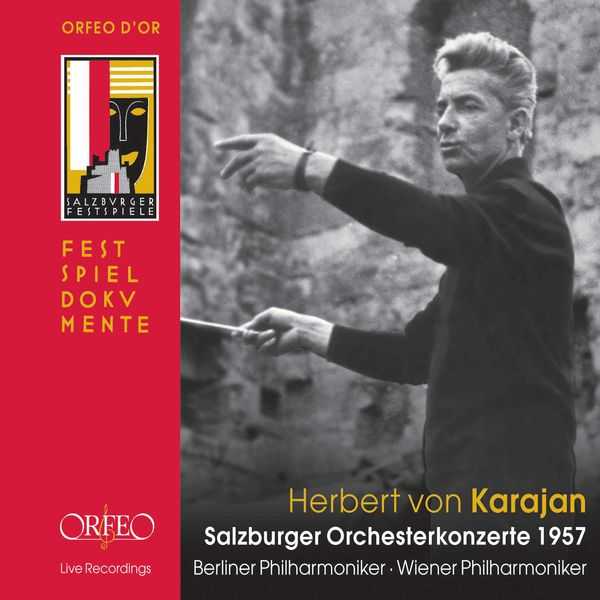
Composer: Theodor Berger, Johannes Brahms, Anton Bruckner, Gottfried von Einem, Arthur Honegger, Wolfgang Amadeus Mozart
Performer: Géza Anda, Gerty Herzog, Lisa Della Casa, Dietrich Fischer-Dieskau, Wiener Singverein
Orchestra: Berliner Philharmoniker, Wiener Philharmoniker
Conductor: Herbert von Karajan
Number of Discs: 4
Format: FLAC (tracks)
Label: Orfeo
Catalogue: C773084
Release: 2008
Size: 702 MB
Recovery: +3%
Scan: yes
CD 01
Bruckner: Symphony No. 8 in C minor
01. I. Allegro moderato
02. II. Scherzo. Allegro moderato – Langsam
03. III. Adagio. Feierlich langsam, doch nicht schleppend
04. IV. Finale. Feierlich, nicht schnell
CD 02
Mozart: Symphony No. 35 in D major, K385 ‘Haffner’
01. I. Allegro con spirito
02. II. Andante
03. III. Menuetto
04. IV. Finale. Presto
Mozart: Piano Concerto No. 21 in C major, K467 ‘Elvira Madigan’
05. I. Allegro maestoso
06. II. Andante
07. III. Allegro vivace assai
Mozart: Symphony No. 41 in C major, K551 ‘Jupiter’
08. I. Allegro vivace
09. II. Andante cantabile
10. III. Menuetto. Allegretto
11. IV. Molto allegro
CD 03
Brahms: Ein Deutsches Requiem, Op. 45
01. I. Selig sind, die da Leid tragen
02. II. Denn alles Fleisch es ist wie Gras
03. III. Herr, lehre doch mich
04. IV. Wie lieblich sind deine Wohnungen
05. V. Ihr habt nun Traurigkeit
06. VI. Denn wir haben hie keine bleibende Statt
07. VII. Selig sind die Toten
CD 04
Berger: Sinfonia parabolica
01. I. Scivolando
02. II. Planando
03. III. Rotando
Einem: Piano Concerto, Op. 20
04. I. Molto moderato
05. II. Adagio
06. III. Allegro con spirito
Honegger: Symphony No. 3, H186 ‘Liturgique’
07. I. Dies Irae. Allegro marcato
08. II. De profundis clamavi. Adagio
09. III. Dona nobis pacem. Andante
1957 was Herbert von Karajan’s first year as artistic director of the Salzburg Festival, and he was determined to leave the world in no doubt about his versatility as a conductor. Four orchestral concerts featured not only core works from the symphonic repertory but also music with which his name is nowadays only rarely associated.Above all, however, he imported the Berlin Philharmonic and divided the concerts between them and the Vienna Philharmonic, a body of players that had previously had no rivals in Salzburg.At the 1957 Festival’s opening concert, it was Vienna’s leading orchestra which, in keeping with tradition, performed Bruckner’s Eighth Symphony in a reading that was arguably more ‘earthy’ and less otherworldly than other performances under Karajan. In particular, the tone colours of the strings and winds, applied with particular assurance and power, enabled the conductor to achieve a sense of the greatest solemnity entirely commensurate with the occasion.The following day the Berlin Philharmonic and their principal conductor brought to an all-Mozart programme the virtuosic and lively interpretative style that orchestra and conductor shared.The programme on this occasion included the ‘Haffner’ and ‘Jupiter’ Symphonies and the C major Piano Concerto with Géza Anda as the soloist. For their second concert with Karajan, the Berliners returned to the Mozarteum – a venue that is nowadays hard to imagine as the setting for such an occasion – for a programme made up entirely of contemporary works, namely, the world première of the Sinfonia parabolica by Theodor Berger, a pupil of Franz Schmidt and Erich Wolfgang Korngold, Gottfried von Einem’s Piano Concerto and Honegger’s Symphonie liturgique, this last-named work in an interpretation that the conductor had the courage to invest with real emotional weight. Honegger’s symphony is very much a confessional work, allowing Karajan to forge a link between it and the piece that he conducted on 22 August in the Felsenreitschule: Brahms’s German Requiem. Here the Vienna Philharmonic was joined by the Vienna Singverein, a chorus that the conductor was to use in many of the great works of the choral repertory over a period of several decades, and by the two soloists Lisa Della Casa and Dietrich Fischer-Dieskau.The result was a performance whose very special qualities can perhaps be best appreciated only at a distance of half a century.